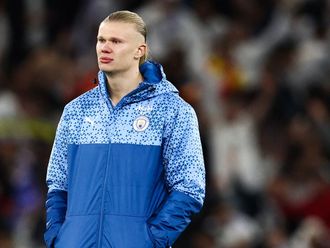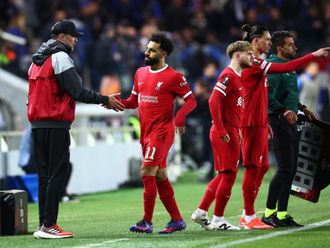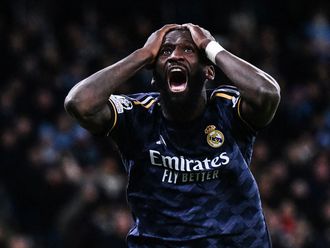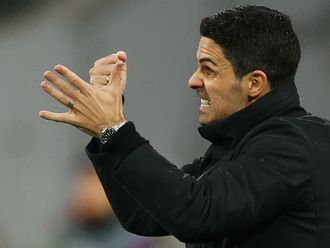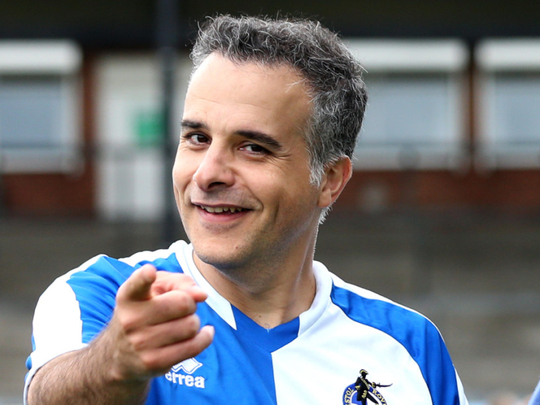
London: Wael Al-Qadi is no ordinary football club owner, it immediately becomes apparent from interviewing him.
“I am a football freak,” the engaging and enthusiastic president of the English third-tier side, Bristol Rovers, tells Gulf News. “I followed Chelsea [as a boy] and I never used to miss a second when they played friendlies or cup games or league games. If [football] is rarely not covered on TV, I follow it on the radio. It’s like any other fan.
“I live and breathe every second of the game.”
English football has increasingly become a playground for faceless and often-clueless foreigners, for whom owning a football club is ostensibly just a vanity project; exhibit ‘A’ being the Venky’s much-maligned running of Blackburn Rovers.
As such, Al-Qadi represents a welcome breath of fresh air amid the all-pervasive stench of greed and self-interest in the modern game.
But the Jordanian businessman has clearly developed a genuine passion and affection for Rovers since his family’s Dwane Sports business assumed control of the club in February 2016.
This is illustrated by the 47-year-old’s desire to eschew the directors’ box in favour of mingling with the club’s fans.
“To go to a football game and not be able to express your emotions and support your team and being restricted in your behaviour, you’re not watching a football game [properly],” explains Al-Qadi, who has attended five World Cups as a fan. “You have to express [yourself]. You have to chant, you have to scream and shout, so I am much more comfortable watching the game and enjoying it [by being in a] section that has fans – and especially your own fans – home and away.”
Al-Qadi’s ardour for football was nurtured in the 1980s when, while studying in London, his father took him to see Chelsea home and away.
“The [Rovers] fans remind me of the old-school Chelsea fans way back then. They are very passionate, committed and loyal no matter what to their team. That got me to buy in [to the project] and I feel I’m one of them now.”
Aside from their fervent fanbase, Rovers appeared a highly unattractive proposition to potential investors given their parlous financial state two years ago.
Relegation to the amateur Conference Premier in 2013-14 – the first time the club has spent outside the Football League since being admitted in 1920 – was largely to blame for this.
Al-Qadi was undeterred, though, as he had been scouring Europe for a club with a specific profile.
“Basically we were looking for a club – and this goes back to the investment return side of it – where a club was at the pure bottom,” says Al-Qadi, who was born in Qatar and who is assistant general manager of the Arab Jordan Investment Bank, which his family founded in 1978. “There was nowhere else to go and they were seconds away from going into bankruptcy. I wanted a club that I could build up from the bottom upwards, unlike most of the investors who are coming in at the top level, be it Premier League or Championship, and paying huge amounts of money.”
Rovers secured immediate promotion back to the Football League in 2015 via the play-offs and then, just months after the Al-Qadi takeover, clinched their place in League One.
The club, known as ‘The Gas’ due to their former Eastville Stadium home’s proximity to gasworks, finished a creditable 10th in League One last season and are currently 15th and into the FA Cup second round.
Al-Qadi is “quite pleased” with such encouraging progress, but stresses: “We believe we should be better than what we are right now and hopefully the team will improve. If you look at the numbers, the attendances, the revenues and all that, then yes, there has been a rise.”
Of his long-term ambition, he adds: “The ultimate goal and dream has to be to reach the Premier League and it has been done before. There are a lot of clubs in the Premier League right now who were in League One not so long ago, so it’s doable.
“But I do not like to put targets that in three years or five years, we need to be here or there. It’s a long-term investment and hopefully the success of our strategy will be reflected one day with success by reaching higher divisions.”
Leicester City’s fairytale Premier League title triumph in 2016 remains a great source of inspiration and an exemplar for clubs of Rovers’ ilk.
Says Al-Qadi, who supported Prince Ali Bin Hussein’s unsuccessful bid to become Fifa president in 2015 and who is an executive member of the Jordan Football Association: “It was one of the greatest-ever stories of sporting success. It was a miracle. This gives hope and ambition to clubs like ours.”
Al-Qadi is first and foremost a pragmatic businessman rather than a football romantic, however.
His “main strategy” is “to build [the club] with the correct foundations, so that it can grow by it itself, organically”.
Central to this aim has been the formation of a development squad to bridge the gap in quality between the academy and the first team.
And, as vice-president of the Asian Football Development Project, a not-for-profit youth project funded by Prince Ali, Al-Qadi is eager for talented Arabs to be given a chance at Rovers.
One such is the 18-year-old left-back, Ghassan Abu Hassan, who plays for the Jordan Under-19s and who has joined the development squad after being recommended by a Jordanian talent-spotter.
Yet Al-Qadi is anxious to emphasise that Middle Eastern prospects – and he admits he is well aware of the UAE’s most-renowned and sought-after player, Omar Abdul Rahman – face a battle to succeed in England.
“Okay, a player has the skills and talent and is technically superb and that’s maybe only 20 per cent of the formula. The rest is can he settle down in England? Can he train on a dark, cold, rainy Thursday night in Bristol? Can he have the hunger, the desire, the power and the strength to compete in the English leagues?
“If they don’t have these attributes, then they’ll fail in English football.”
One high-profile Arab who has done anything but fail in English football is the Abu Dhabi-based Manchester City owner, Shaikh Mansour Bin Zayed Al Nahyan, Deputy Prime Minister and Minister of Presidential Affairs, who has presided over five major trophy triumphs in nine years.
“People who criticise saying, ‘Oh, he’s just spending money and buying the league’, [I say] ‘No, there’s the other side of it’,” Al-Qadi points out. “He’s done amazingly for the community there and also brought success to Manchester City Football Club.”
He is referring to the fact that Shaikh Mansour’s munificence has funded a £1billion (Dh4.82bn) regeneration of a run-down area of Manchester via 6,000 new homes and a state-of-the-art football academy and campus.
There have been varying reports of Al-Qadi’s family’s own wealth – from £1.4bn (Dh6.74bn) to £400million (Dh1.927bn) – neither of which he wants to confirm. So could he have emulated Shaikh Mansour?
“There are only very, very few people on this Earth that could do what the likes of the Premier League clubs are doing,” he replies, laughing. “They [City] are doing things from the top downwards, so you can’t compare them with us.”
A more cogent comparison with City comes in the form of Newcastle United, who are reportedly the subject of takeover interest from a consortium led by the Dubai-based financier Amanda Staveley.
Al-Qadi says of this prospect: “Newcastle is a huge club and I read some time ago that they sold 35,000 season tickets before the start of the season. I believe anybody who is going to purchase and invest in Newcastle, they have potentially a mega club that could be taken on to the next level.
“If someone was to ask my advice [about taking over Newcastle], I would say: ‘Go ahead’.”
Al-Qadi reiterates his unwavering commitment to Rovers when asked whether he would ever fancy owning a bigger club.
“It’s more of an affection and being emotionally tied into Bristol Rovers now and for me, it doesn’t matter if it’s a Premier League or Championship or League One or League Two [club]. The hope and ambition and emotional gain is to have success with Rovers and only Rovers.”


